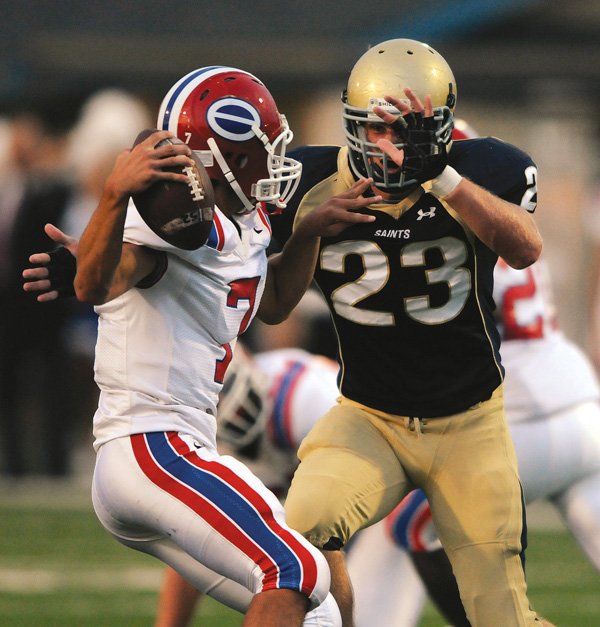FAYETTEVILLE — For most major college football programs, it’s all about the face time.
No matter if it’s the national game of the week or a regional affair, face time in football means getting your team’s name plastered across as many television sets as possible. And these days, the race is on between the big boys on the college gridiron to attract top recruits with as much TV time as possible.
But while college teams have been enjoying the major network contracts for years, the benefi ts of televised football have also begun to trickle down to the high school level in recent seasons.
Particularly for teams here in Northwest Arkansas.
This upcoming 2010 season, one area team — Shiloh Christian — will have not one, but two of its games televised. The Saints will play Euless, Texas Trinity in the Kirk Herbstreit Classic, in a Labor Day special to be aired on Fox Sports Net, then will face Greenwood the following week in game to be aired on ESPNU.
For the Saints, having two games on the tube this year gives them a decided edge over all other teams in the state in one department. Exposure.
“It’s obviously a great opportunity for our program to show a lot of people about your kids,” Shiloh Christian coach Josh Floyd said. “It’s defi nitely exciting for our kids and gets them motivated to play in front of a lot of people.”
Floyd knows a little about getting his team ready for a high profi le, made for TV game. Last year, Shiloh faced Shreveport, La., Evangel on Fox Sports in a contest won by the Saints, 37-36 at Champions Field in Springdale.
The victory not only helped Floyd’s team get recognized on a national level, as the Saints would finish the season ranked No. 24 in the USA Today national poll, but it also helped certain Shiloh players gain the attention of Division I colleges who might not have noticed their abilities if not for the televised game.
“Kansas State coaches were able to see Samuel Harvill in that game and it definitely helped with his recruitment there,” Floyd said. “Normally the teams playing on TV are good teams, so coaches can see how players perform against the better teams. Like last year, Evangel had five D1 guys on defense and that game did a lot for Kiehl Frazier to show college coaches how he performed against great players.
“It def initely helps your kids.”
Shiloh Christian isn’t the only local team to see televised games pay off. In 2005, the television explosion in high school football oft cially began in Arkansas when Springdale played both Shreveport, La., Evangel and Jenks, Okla., in front of the TV sets. And last year, Fayetteville’s game against Jefferson City, Mo., was shown on CBS College Sports.
For Springdale in 2005, which still is considered one of the top high school teams ever in the state, the televised games were used to help publicize such top recruits as Mitch Mustain, Damian Williams, Bartley Webb and Ben Cleveland. But while the games against Evangel and Jenks helped the team and the individual recruits become more well known across the country, the Red’Dogs — like the others playing in televised games — had to avoid the distractions and pressure that came with playing on the air.
“I remember it was a really big deal when we went down to Shreveport and played on TV that first time,“ said Springdale offensive line coach Dennis Debusk, who was also as assistant with the Red’Dogs in 2005. “But that team was so focused and they wouldn’t let it be a distraction. They were such a special group that they didn’t worry about any of that other stuff going on. But I’m sure it did help those players’ (recruitment) and we were really excited to be on television.”
Almost all televised games for local teams have also resulted in wins on the field. The one exception was Fayetteville’s 20-18 loss against Jeff erson City last season. Still, despite the defeat, Fayetteville coach Daryl Patton said the Purple’Dogs’ TV appearance was more positive than negative in the long run.
“After the game was over with, I had e-mails and letters from people in New York, Fayetteville graduates from New York and Florida and California. I mean, they were just really proud, a sense of pride in our alma mater,” Patton said. “So it was neat showing everybody nationally our brand of football and what we could do and Arkansas football, how good it is.”

